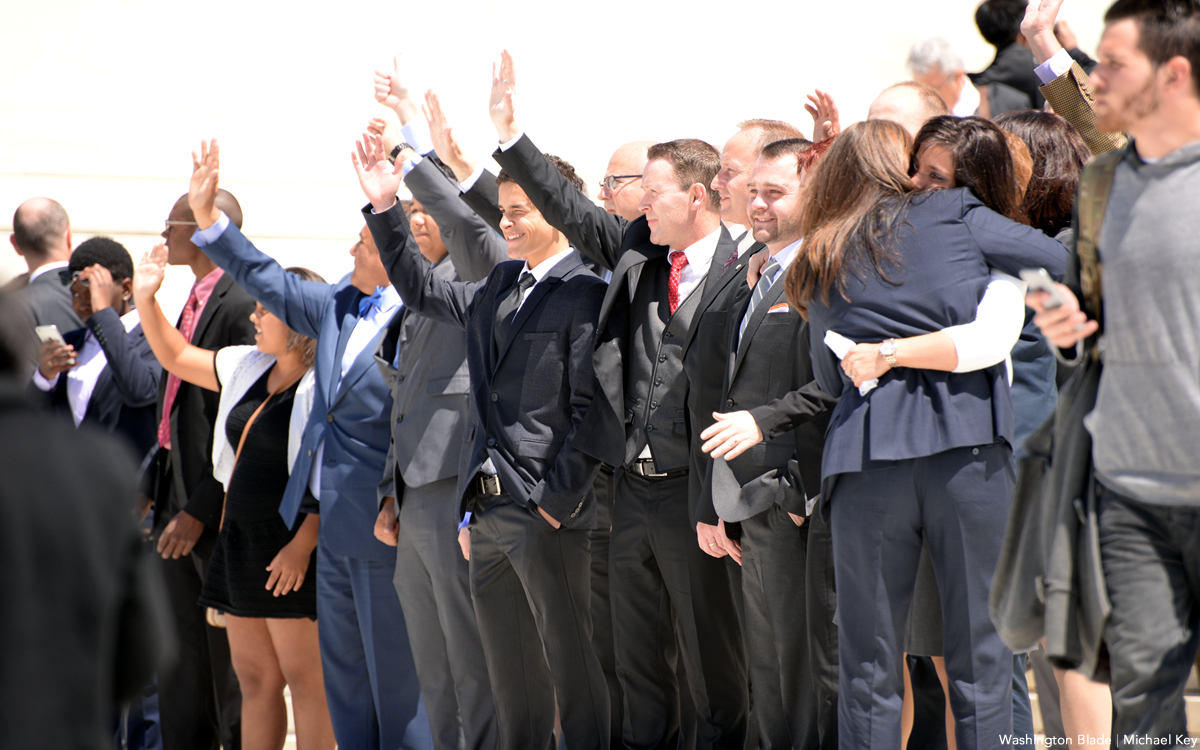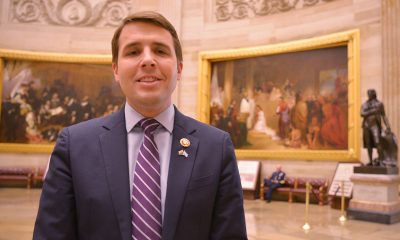U.S. Supreme Court
Obergefell lawyer discusses post-Roe fate of marriage equality
Dan Canon represented Ky. plaintiffs in landmark case

Faced with the likely possibility that the U.S. Supreme Court is poised to take away the constitutional right to marry for same-sex couples’, Congressional Democrats this week reintroduced legislation designed to forestall potential fallout of a reversal of the court’s landmark 2015 Obergefell v. Hodges ruling.
The Respect for Marriage Act sailed through the U.S. House of Representatives on Tuesday with support from a quarter of the Republican caucus totaling 47 members. A companion bill in the U.S. Senate introduced by U.S. Sens. Tammy Baldwin (D-Wis.) and Dianne Feinstein (D-Calif.), with co-sponsors U.S. Sens. Rob Portman (R-Ohio) and Susan Collins (R-Maine), now stands a realistic chance of securing the endorsement of 10 Senate Republicans, which is necessary to reach the 60-vote bipartisan threshold majority to break a filibuster.
The prospect of a floor vote on the bill inched closer, possibly as early as next week with U.S. Sen. Ron Johnson’s (R-Wis.) commitment on Thursday to not oppose the bill. Another sign of tepid support among the Senate Republicans this week came from U.S. Sen. Thom Tillis (R-N.C.), who said he “probably would” vote for the legislation, while U.S. Sen. Lisa Murkowski (R-Alaska)’s endorsement was more enthusiastic.
“Not only would I like to see Roe, Casey, and Griswold on contraception codified,” said the Alaska senator, “but I’ve also made clear my support … for gay marriage years ago.”
Last month, when the High Court overturned Roe v. Wade, Justice Clarence Thomas wrote in his concurring opinion that he saw a valid interest in revisiting other rulings where the court had established legal precedent with other constitutional privacy rights issues to include Obergefell.
Scrambling to protect reproductive rights after the Dobbs v. Jackson ruling, Congressional Democrats introduced an ambitious bill to codify the right to abortion nationwide, which earned only seven votes from House GOP members and was doomed to fail in the Senate (despite Murkowski’s stance on the matter.)
With the Respect for Marriage Act, Democrats have opted for a more modest approach to mitigate some of the consequences resulting from a decision overturning marriage equality, betting that its limited scope would win over enough Senate Republicans to pass it. Ahead of the 2022 midterm elections, Democrats also hope to demonstrate their commitment to protecting marriage equality support which reached 71 percent of Americans according to a Gallup poll in June.
In an emailed statement to the Los Angeles Blade, U.S. Rep. Barbara Lee (D-Calif.) discussed how Congressional Democrats are gearing up to battle the Supreme Court’s looming threat of taking away rights from same-sex couples:
“As we’ve seen with the Dobbs decision, this far-right, Republican-appointed court has demonstrated clearly they won’t hesitate to undermine the will of the people and revoke long-established constitutional protections. If they overturned 50 years of the right to an abortion with Roe, they’ll overturn a decade of marriage equality with Obergefell. Make no mistake: Democrats are the party fighting for fundamental rights and bodily autonomy, and we proved that this week with passage of the Respect for Marriage Act.”
By effectively neutralizing the Clinton-era Defense of Marriage Act, the legislation would recognize same-sex marriage at the federal level, adding additional protections to safeguard against the possibility that the constitutional right to marriage equality would be revoked by a court ruling.
Should the Supreme Court issue a ruling allowing states to ban same-sex marriage, civil rights lawyer Dan Canon, who represented the Kentucky plaintiffs in the Obergefell case, told the Blade the Respect for Marriage Act would require states to recognize marriages of gay and lesbian couples performed in places where they are legal. At least, that is, in states where officials would follow the federal law.
“Unless and until the federal courts say it’s a violation of a government actor’s free exercise rights to have to recognize a marriage — which is a radical, batshit-crazy legal position, but still a possible outcome — marriages in places with halfway sane judges and/or executive branch officials should be fine,” Canon said.
“The RFMA (Respect for Marriage Act) gives the attorney general and private citizens a civil enforcement mechanism,” Canon said, but state government employees may nevertheless refuse to recognize the legal marriages of same-sex couples, and conservative courts could decide their religious objections and free exercise rights supersede laws like the Respect for Marriage Act.
Additionally, Canon said despite the absence of any solid legal argument against it, one can imagine a case directly challenging the Respect for Marriage Act might be blessed by conservative federal district and circuit court judges, ultimately reaching the High Court whose conservative majority might rule, for example, that “this application of RFMA violates the free exercise rights of the clerk” or whomever is challenging the law.
Such an outcome would spell “utter chaos,” Canon said, throwing into question not just whether a state — but also whether a county or town — will recognize same-sex marriages. Alternatively, a governor, without objection from conservative federal courts, could issue an executive order barring officials from recognizing legal same-sex marriages, and the Supreme Court could decline to weigh in on the matter, Canon said.
A case challenging same-sex marriage could chart a similar path
Seven years ago, a Kentucky county clerk named Kim Davis denied marriage licenses to same-sex couples in violation of a federal court order pursuant to the Supreme Court’s ruling in Obergefell. When she was sued, Canon represented parties in the highly publicized litigation, which the Supreme Court declined to hear on appeal.
Thomas and Justice Samuel Alito objected to the court’s refusal to consider Davis’s case, issuing statements in which they called her a “victim.” Canon said challenges to Obergefell are likely to turn on the same legal question at issue then: whether the free exercise of religion trumps marriage equality.
And it’s not just the Supreme Court, with its 6-3 conservative supermajority, that would be more receptive to such arguments than it might have been in 2015, Canon said.
“When we litigated that [Kim Davis] case, we were pretty sure that no court in America would say that Davis’s right to impose her religion on her constituents was somehow superior to anyone’s right to a marriage license,” he said. “Now? I’m not so sure.”
GOP lawmakers and the conservative legal movement have moved so far to the right in recent years Canon said that he expects Congressional Republicans, should they secure a majority in both chambers, will try to ban marriage equality in all 50 states, while the Supreme Court may well take a case challenging Obergefell regardless of how shaky its footing.
“It is hard to imagine an ‘injury’ sufficient to confer standing in a way that would present a halfway decent case for the Court to revisit Obergefell based on an interpretation of the 14th Amendment,” Canon said. Still, the conservative majority justices are “advancing an ideological agenda” and “none of this has to make sense according to the playbook we’re used to.”
A successful case would most likely begin with “a Christian nationalist attorney general or governor saying, ‘we won’t recognize marriage equality,’” and the Supreme Court might rule their refusal is lawful per the First Amendment, Canon said.
U.S. Supreme Court
Supreme Court to hear conversion therapy case in October
Harmful and discredited practice is banned in 23 states and D.C.

The U.S. Supreme Court on Monday agreed to hear a case about whether state and local governments can enforce bans on anti-LGBTQ conversion therapy for children, a discredited and harmful practice that has been banned by 23 states and D.C.
The case, which will be argued in the new term that begins in October, began in Colorado Springs, Colorado where a licensed professional counselor filed a challenge to a ban in 2022, arguing the law interferes with her ability to treat patients with “same-sex attractions or gender identity confusion” who “prioritize their faith above their feelings.”
The Supreme Court in 2023 declined to hear a challenge to conversion therapy bans out of Washington state, but conservative justices Clarence Thomas, Samuel Alito, and Brett Kavanaugh voted in favor of taking up the case.
The Colorado therapist, Kaley Chiles, is represented by the Alliance Defending Freedom, which is described by the Southern Poverty Law Center as “a legal advocacy and training group that has supported the recriminalization of sexual acts between consenting LGBTQ adults in the U.S. and criminalization abroad; has defended state-sanctioned sterilization of trans people abroad; has contended that LGBTQ people are more likely to engage in pedophilia; and claims that a “homosexual agenda” will destroy Christianity and society.”
The U.S. District Court for the District of Colorado struck down Chiles’s lawsuit in 2022. Her case was appealed to the Supreme Court from the U.S. Court of Appeals for the 10th Circuit, which upheld the ban in 2023 on the grounds that it regulates professional conduct, not speech.
Human Rights Campaign President Kelley Robinson released the following statement on Monday:
“The Supreme Court’s decision to take up this case isn’t just about so-called ‘conversion therapy’ – it’s about whether extremists can use our courts to push their dangerous agenda, in an effort to erase LGBTQ+ people and gut protections that keep our kids safe. There’s no debate: so-called ‘conversion therapy’ is a dangerous practice, not therapy, and it has no place in our communities. These bans exist to protect LGBTQ+ children from harm—period.
Attacks on LGBTQ+ rights are the entry point to attacks on all of our rights. The same people trying to legalize abuse under the guise of ‘therapy’ are the ones banning books, ripping away reproductive rights, and undermining our democracy. The Supreme Court must uphold the 10th Circuit decision finding that these laws are constitutional.”
HRC added, “So-called ‘conversion therapy,’ sometimes known as ‘reparative therapy,’ is a range of dangerous and discredited practices that falsely claim to change a person’s sexual orientation or gender identity or expression.”
The group continued, “Such practices have been rejected by every mainstream medical and mental health organization for decades, but due to continuing discrimination and societal bias against LGBTQ+ people, some practitioners continue to conduct conversion therapy. Minors are especially vulnerable, and conversion therapy can lead to depression, anxiety, drug use, homelessness, and suicide.”
U.S. Supreme Court
Supreme Court will not hear challenge to Tenn. drag restrictions
Republican lawmakers limited access to “adult entertainment” in 2023

The U.S. Supreme Court on Monday declined to hear a case challenging Tennessee’s law restricting drag performances, which was enacted by Republican state lawmakers in 2023.
The Tennessee Adult Entertainment Act forbids “adult-oriented performances” that take place in public or where they may be seen by minors. Legislators specified the legislation was meant to target drag shows.
A judge on the U.S. District Court for the Western District of Tennessee ruled that the law was “unconstitutionally vague and substantially overbroad,” allowing drag performances to continue in parts of the state. The 6th U.S. Circuit Court of Appeals reversed the decision in July, however, ruling that the theater company that filed the complaint lacked standing to sue.
President Donald Trump said that his decision to name himself chair of the Kennedy Center shortly into his second term came at least partially in response to the iconic performing arts center’s history of hosting drag shows, which he called “anti-American propaganda.”
U.S. Supreme Court
Supreme Court to consider case against Montgomery County Public Schools
Plaintiffs challenging LGBTQ-specific curriculum policy

The U.S. Supreme Court on Jan. 17 announced it will consider the case of a group of Montgomery County parents who are challenging a policy that does not allow them to “opt out” their children from classes in which lessons or books on LGBTQ-related topics are taught.
The parents in a federal lawsuit they filed in May 2023 allege the Montgomery County Public Schools policy violates their religious beliefs.
A federal judge in Maryland on Aug. 24, 2023, ruled against the parents. The 4th U.S. Circuit Court of Appeals upheld the ruling.
“Under the 4th Circuit’s reasoning, parents cannot be heard until after the damage has been done to their children,” reads the Supreme Court filing that CBS News obtained. “But there is no unringing that bell — by then, innocence will be lost and beliefs undermined.”
-

 The White House5 days ago
The White House5 days agoWhite House does not ‘respond’ to reporters’ requests with pronouns included
-

 Arts & Entertainment5 days ago
Arts & Entertainment5 days ago‘Gay is Good’ Pride Pils Can Celebrates Frank Kameny’s 100th Birthday for WorldPride in D.C.
-

 District of Columbia2 days ago
District of Columbia2 days agoReenactment of 1965 gay rights protest at White House set for April 17
-

 Hungary2 days ago
Hungary2 days agoHungarian MPs amend constitution to ban public LGBTQ events












